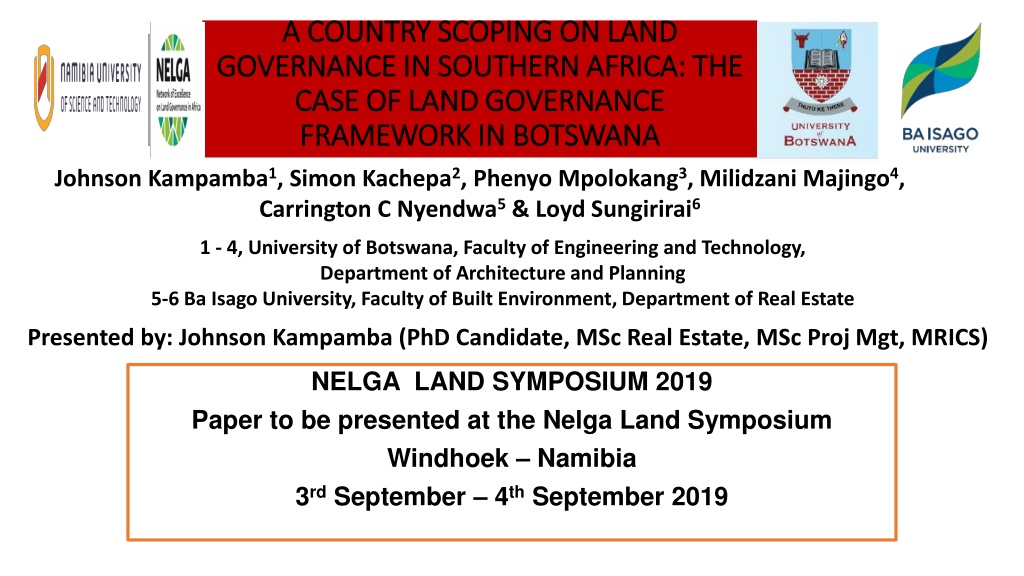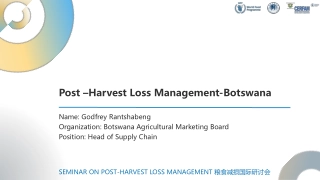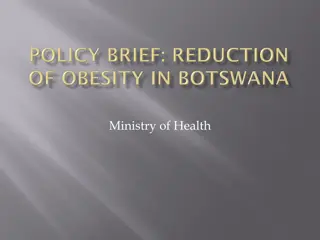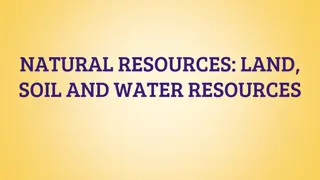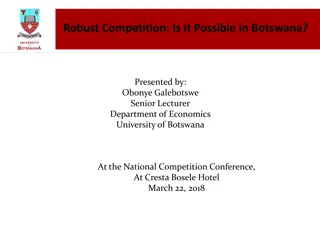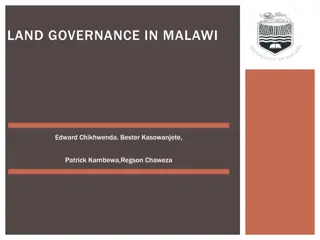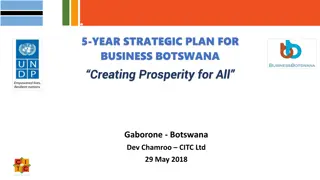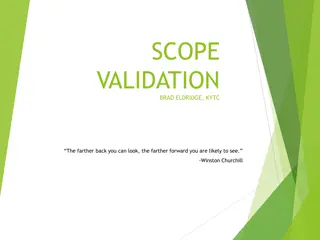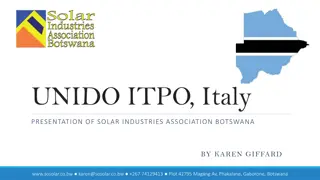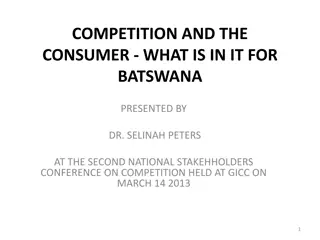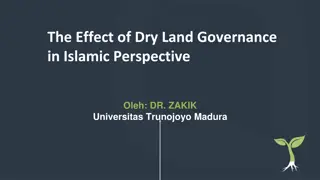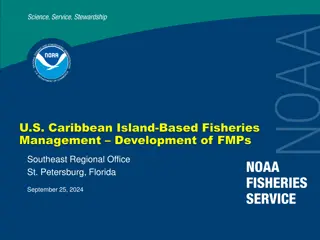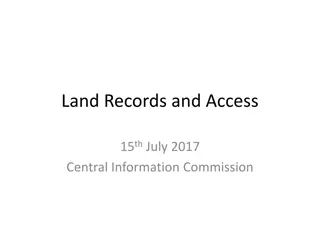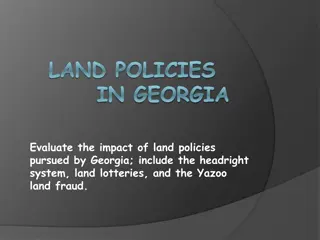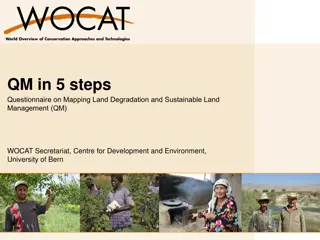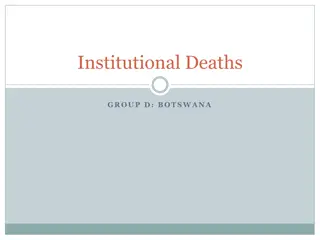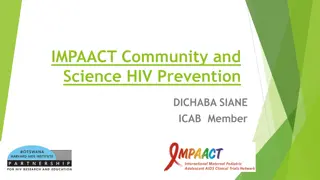Land Governance Framework in Botswana: A Country Scoping Study
Botswana, a landlocked middle-income country in Southern Africa, faces challenges such as high population growth, unemployment, poverty, and a less skilled workforce. This study examines the land governance framework in Botswana, focusing on key challenges in land administration, dispute resolution, legal frameworks, public land management, provision of land information, and taxation for good land governance.
Download Presentation

Please find below an Image/Link to download the presentation.
The content on the website is provided AS IS for your information and personal use only. It may not be sold, licensed, or shared on other websites without obtaining consent from the author. Download presentation by click this link. If you encounter any issues during the download, it is possible that the publisher has removed the file from their server.
E N D
Presentation Transcript
A COUNTRY SCOPING ON LAND A COUNTRY SCOPING ON LAND GOVERNANCE IN SOUTHERN AFRICA: THE GOVERNANCE IN SOUTHERN AFRICA: THE CASE OF LAND GOVERNANCE CASE OF LAND GOVERNANCE FRAMEWORK IN BOTSWANA FRAMEWORK IN BOTSWANA Johnson Kampamba1, Simon Kachepa2, Phenyo Mpolokang3, Milidzani Majingo4, Carrington C Nyendwa5 & Loyd Sungirirai6 1 - 4, University of Botswana, Faculty of Engineering and Technology, Department of Architecture and Planning 5-6 Ba Isago University, Faculty of Built Environment, Department of Real Estate Presented by: Johnson Kampamba (PhD Candidate, MSc Real Estate, MSc Proj Mgt, MRICS) NELGA LAND SYMPOSIUM 2019 Paper to be presented at the Nelga Land Symposium Windhoek Namibia 3rdSeptember 4thSeptember 2019
1. Introduction 2. Methodology 3. Key challenges 4. Conclusions 2 NELGA - 2019
INTRODUCTION INTRODUCTION COUNTRY BACKGROUND BACKGROUND COUNTRY Botswana is a middle income country Land locked country 582, 000km2 Population 2.3 million (Statistics Botswana, 2011); Majority of people are concentrated on the eastern part (Adams & Kalabamu, 2003); Per capita income of US$7,726 (Statistics Botswana, 2014) Gini coefficient of 0.61 3 NELGA 2019
INTRODUCTION INTRODUCTION However, Botswana has also challenges: High population growth in urban areas (40-65%); High unemployment rate (35%); High levels of poverty (20%); and Less skilled workforce. NELGA 2019 4
RESEARCH APPROACH USED RESEARCH APPROACH USED This study used document review and analysis: Government reports, Acts and policy documents; Published journal articles These reviewed based on the relevant themes using content analysis. 5 NELGA 2019
RESULTS RESULTS KEY CHALLENGES KEY CHALLENGES Land Administration Land Administration Indicators Dispute Resolution and conflict management Land Legal and Institutional framework Management of public land Provision of Land Information Management and Taxation Framework for Good Land Governance 6 NELGA 2019
RESULTS RESULTS KEY CHALLENGES KEY CHALLENGES Institutional and Legal framework/Dispute Resolution Lack of synchronisation of legal instruments (Acts, Policy documents) Deeds Registry only caters for common law land rights; Deeds Registry is using paper based system; Disputes not resolved well in time (Land Tribunal) Compensation amounts not adequate 7 NELGA 2019
RESULTS RESULTS KEY CHALLENGES KEY CHALLENGES Land Management and Taxation Lack of a well coordinated system Delays in Land Allocation; Poor record keeping Corruption Shortage of Land in Cities and Towns; Gentrification Lack of a computerised Deeds Registry System NELGA 2019 8
RESULTS RESULTS KEY CHALLENGES KEY CHALLENGES Valuation and Taxation Lack of a well coordinated local property taxation system; Rating Valuation not computerised Outdated valuation rolls High default rates Lack of a well coordinated property taxation system; Property Transfer Tax - Market value underdeclared Tax on rental income does not take into account principal amount Administered by people without skills in property 9 NELGA 2019
RESULTS RESULTS KEY CHALLENGES KEY CHALLENGES Management of Public Land Lack of well computerised system Disjointed roles; Overpopulation of elephants; Poaching Destruction of homesteads and crop fields Low crop yields (Food insecurity) Overdependence on natural resources (eg Sand) Grazing and fencing policy not yielding results Lack of green zones in cities NELGA 2019 10
RESULTS RESULTS KEY CHALLENGES KEY CHALLENGES Provision of Land Information System (LIS) Efforts to achieve this are futile (BLIS, SLIMS/TLIMS, LAPCAS) Information is still disjointed and in paper format; Documents have been digitised but not web based; An integrated land information system is still lacking; Maps (Surveys) Layout and guide Plans (DTRP) Building Plans (Councils); Deeds (Title Deeds) Valuation Roll (Local Govt) NELGA 2019 11
2019 LAND REFORMS 2019 LAND REFORMS Differentiate the permissible amounts of ancillary usages for both ploughing fields and Natural Agriculture Zones. The Development Control Code to allow for changes of use on agriculture land of up to 50% of the total area of the land parcel. The Integrated Agriculture Farming Guidelines have been amended to allow ancillary use provision of up to 50% of the total area of the land parcel. Transfer duty from 5% to 30% for Non Citizens. NELGA 2019 12
Conclusions Conclusions Country Profile and background If measures are not taken Botswana will not resolve the income disparity. The per capita income has been reducing from US$16,000 (2005) to US$8,259 (2018). Institutional and legal framework Lack of a well synchronised systems could affect productivity and service delivery Dissatisfied customers and low economic output 13 NELGA 2019
Conclusions Conclusions Land Management and Taxation Lack of a well coordinated system could result in corrupt acts and double allocations. This could also lead to delays in allocation of land. Revenue leakage Hinders FDI Management of public Land Food insecurity would lead to extreme poverty levels Poaching if not well managed would lead to a reduced population of elephants NELGA 2019 14
Conclusions Conclusions Provision of Land Information System (LIS) The absence of a proper land information system would create difficulties for users as well as beneficiaries. Recommendations Botswana should provide a well coordinated framework that can embrace e-governance principles. Computerising and linking all sectors and units of land administration in order to achieve good land governance which should be web based. NELGA 2019 15
